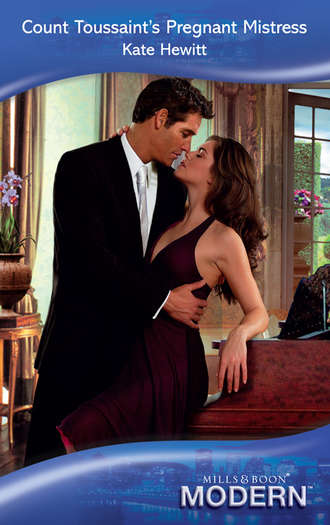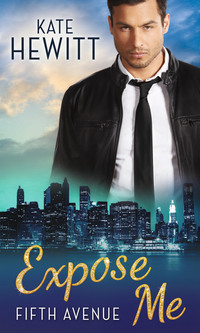
Полная версия
Count Toussaint's Pregnant Mistress

Luc scanned the headlines and bylines with a distracted air, unable to voice even to himself what—who—he was looking for.
Then he saw it.
‘Piano Prodigy…pregnant?’
The photo was a blurry shot of Abby walking down a street in London. The newspaper had helpfully added a red circle to highlight the slight swell of her middle.
It only took up a few inches of space on the third page of the arts section. Abby, Luc realised, was hardly news any more.
Yet she was, it seemed, pregnant. And he knew without even a flicker of doubt that if there was indeed a baby then it was his.
He pushed the paper away, unfocused, unseeing, his mind spinning with thoughts he could barely articulate. The coffee at his elbow grew cold and the sun rose in the sky, casting longer and longer shadows on the floor.
Finally, as if shaking himself from a dream, Luc rose. He reached for his cellphone, flicking it open and punching buttons. When his assistant answered, he spoke tersely. ‘I need the jet. This morning.’
Luc snapped his cell shut and gazed out at the River Seine winding through the city, at the cherry trees just beginning to blossom. Then, turning away from the charming sight, he prepared to pack for his trip to England…to find Abby.
Kate Hewitt discovered her first Mills & Boon® romance on a trip to England when she was thirteen, and she’s continued to read them ever since. She wrote her first story at the age of five, simply because her older brother had written one and she thought she could do it too. That story was one sentence long—fortunately they’ve become a bit more detailed as she’s grown older. She has written plays, short stories, and magazine serials for many years, but writing romance remains her first love. Besides writing, she enjoys reading, travelling, and learning to knit.
After marrying the man of her dreams—her older brother’s childhood friend—she lived in England for six years and now resides in New York State, with her husband, her four young children, and the possibility of one day getting a dog. Kate loves to hear from readers—you can contact her through her website, www.kate-hewitt.com
Count Toussaint’s Pregnant Mistress
By
Kate Hewitt

www.millsandboon.co.uk
To Anna and Brenda, for giving my girls a love of music. Thank you for all you do!! K.
CHAPTER ONE
THE applause had ended and a hushed silence came over the concert hall, a wonderful expectancy that gave the room—and Abigail Summers—an almost electric excitement.
She took a breath, her fingers poised over the keys of the grand piano on the centre stage of the Salle Pleyel in Paris, closed her eyes, and then began to play.
The music flowed from her soul through her fingers, filling the room with the haunting, tormented sounds of Beethoven’s twenty-third sonata. Abby was not conscious of the audience who sat in enthralled silence, who had paid nearly a hundred euros simply to listen to her. They melted away as the music took over her body, mind and soul, a passionate force both inside her and yet separate from her. Seven years of professional playing and a lifetime of lessons had taught her to completely and utterly focus on the music.
Yet, halfway through the Appassionata, she became…aware. There was no other word for the feeling that someone was watching her. Of course, several-hundreds of people were watching her, but this—he, for she knew instinctively it was a he—was different. Unique. She could feel his eyes on her, even though she didn’t know how. Why.
Who.
Yet she didn’t dare look up or lose her focus, even as her cheeks warmed and her skin prickled, her body reacting with sensual pleasure to a kind of attention she’d never experienced and couldn’t even be certain was real.
She found herself longing for the piece to end, all twenty-four minutes of it, so she could look up and see who was watching her. How could this be happening? she wondered with a detached part of her mind even as the music rippled from under her fingers. She’d never wanted a piece to end, had never felt the attention of one person like a spotlight on her soul.
Who was he?
Or was she just being fanciful, thinking that someone was there? Someone different. Someone, she felt strangely, for whom she’d been waiting her whole life.
Finally the last notes died away into the stillness of the hushed hall, and Abby looked up.
She saw and felt him immediately. Despite the glare of the stage lights and the sea of blurred faces, her eyes focused immediately on him, her gaze drawn to him as if by a magnet. There was something almost magnetic about it, about him. She felt as if her body were being irresistibly pulled towards him even though she remained seated on the piano bench.
He gazed back, and in the few seconds she’d had to look upon him her buzzing brain gathered only a few details: a mane of dark, slightly raggedly kept hair, a chiselled face, and most of all blue eyes, bright, intense, burning.
Abby was conscious of the rustling of concert programs, people shifting in their seats, the wave of speculative concern that rippled through the room. She should have started her next piece, a fugue by Bach, but instead she was sitting here motionless, transfixed, wondering.
She didn’t have the luxury of asking questions or seeking answers. Taking a deep breath, she willed herself to focus once more, to think of nothing but the music. The beauty.
Yet even as she began the piece by Bach, the audience seeming to sit back in their seats with a collective sigh of relief, she was still conscious of him, and she wondered if she would see him again.
Jean-Luc Toussaint sat in his seat, every muscle tense with anticipation, with awareness, with hope. It was an emotion he hadn’t felt in a long time—months at the very least, most likely years. He hadn’t felt anything at all. Yet when Abigail Summers, the world-renowned pianist prodigy, had come onto the stage he’d felt hope leap to life inside him, had felt the ashes of his old self stir to life in a way he had never thought to experience again.
He’d seen pictures of her, of course; there was a rather artistic photograph of her outside the Salle Pleyel, a graceful silhouette of her at the piano. Yet nothing had prepared him for the sight of her coming onto the stage: her head held high, her glossy, dark hair pulled into an elegant chignon, the unrelieved black evening-gown she wore swishing about her ankles. Nothing had prepared him for the response he’d felt in his own soul, for the emotions—hope, even joy—to course through him.
He’d tried to dismiss the feelings as mere desperate imaginings, for surely he was desperate? It was six months since Suzanne had died, and little more than six hours since he’d discovered her letters and realized the truth about her death. Had felt the blame and the guilt, corrosive and consuming.
He’d left the chateau and all of its memories for Paris, avoiding his flat or any of the remnants of his former life. He’d come to this concert as an act of impulse; he’d seen a billboard advert and he’d wanted to lose himself in something else, to not have to think at all, or even feel.
He couldn’t feel; he was poured out, empty, barren of emotion…until Abigail Summers had crossed the stage.
And when she’d played…Admittedly, the Appassionata was one of his favourite sonatas; he understood Beethoven’s frustration, the inevitability of the composer’s disability and his own inability to stop its relentless development. He felt that way about his own life, the way things had spiralled downwards, out of his control…and without him even realizing it until it was too late—far, far too late.
Yet Abigail Summers brought a new energy and emotion to the piece, so much so that Luc found his hands clenching into fists, his eyes burning as he gazed at her, as if he could compel her to look up and see him.
And then she did. Luc felt a sudden jolt of recognition, which seemed impossible, as he’d never met or even seen her before. Yet as their eyes met he felt as if something longmissing had finally slid into place, as if the world had righted itself, as if he had finally righted himself and been made whole.
He felt hope.
It was a heady, wonderful, addictive feeling. It was also frightening, feeling so much, and yet still he wanted more. He wanted to forget everything that had happened, all the mistakes he’d made in the last six years. He wanted that blissful oblivion, to lose himself in this look, this woman, even if only for a time. Even if it couldn’t last.
Their eyes met and locked, the moment stretching and spiralling between them. Then, as the audience grew restless, she looked back down, and after a tense moment—he didn’t think he imagined that hesitation—she began to play.
Luc sat back and let the music wash over him. That one look had caused a deep hunger to open up inside him, a restless longing to connect with another person, with her, as he never truly had with anyone. Yet even as the hunger took hold of him he felt the more familiar hopelessness wash over him. How could he want someone, have someone, when he had nothing, absolutely nothing, left to give?
Abby sank onto the stool in front of the mirror in her dressing-room backstage. She let out a shaky breath and closed her eyes. The concert had been endless. She’d paced restlessly all through intermission, which had hardly benefitted her playing in the second half. If her father and manager had been present, he would have urged her to drink some water, to relax and focus. Think of the music, Abby. Always the music. She’d never been allowed to think of anything else; before tonight she hadn’t known she wanted to.
Yet seeing that man—who was he?—had caused something inside her to shift, loosen, and she was aware of a need she’d never felt before. A need to see him, talk to him, touch him, even.
She shivered, a reaction both of longing and a little fear. Her father wasn’t here, he was back at the hotel with a head cold, and for once she didn’t want to think of the music. She wanted to think of the man. Would he come? Would he try to get backstage and see her? There were always several dozen appreciative fans who tried to meet her; some sent flowers, congratulations, invitations. Abby accepted the gifts and refused the invitations. That was her father’s strict policy; part of her allure, he insisted, was her sense of remoteness. For seven years she’d been kept at a distance from her public, from life itself, in order to build her reputation as the talented and elusive Abigail Summers, Piano Prodigy.
Abby made a face at her reflection in the mirror. She’d always hated that nickname, a name coined by the press that made her feel like a trained poodle, or perhaps something a bit more exotic, a bit more remote, as her father had always wanted.
Right now she had no desire to be remote. She wanted to be found, known. By him.
Ridiculous, her mind scoffed. It had been but a moment, a single look. She hadn’t dared look at him again; she’d been too afraid, fearful of both seeing and not seeing him again. Both possibilities seemed dangerous. Even so, the memory of those few shared seconds resonated through her body, every nerve twanging with remembered feeling.
She’d never felt that way before. She’d never felt so…alive. And she wanted to feel it again. Wanted to see him again.
Would he come?
A light, perfunctory knock sounded at the door and one of the Salle Pleyel’s staff poked her head through. ‘Mademoiselle Summers, recevez-vous des visiteurs?’
‘I…’ Abby’s mouth was dry, her mind spinning. Was she receiving visitors? The answer, of course, was no. It was always no. Send them a signed program, Abby, and be done with it. You can’t be just another girl. You need to be different.
‘Are there many?’ she finally asked, in flawless French, and the woman gave a little shrug.
‘A few…a dozen or so. They want your autograph, of course.’
Abby felt a sharp little stab of disappointment. Somehow she knew this man would not want her autograph. He wasn’t a fan. He was…what? Nothing, her mind insisted almost frantically, even as her heart longed for it to be otherwise. ‘I see.’ She swallowed, looked away. ‘All right. You may send them in.’
The concert-hall manager, Monsieur Dupres, appeared in the doorway, a look of disapproval on his dour face. ‘It was my understanding that Mademoiselle Summers did not accept visitors.’
A crony of her father, Abby thought with a cynical smile. He had them in every concert hall.
‘I believe I know whether I accept visitors or not,’ she replied coolly, although her palms were damp and her heart was thudding. She didn’t question staff and she didn’t make a fuss. That was her father’s job. Her job was simply to play. And that had been enough, until now. At least she’d always thought it had. Right now she was hungry, anxious, craving more than the safe, ordered, managed existence she’d been living for as long as she could remember. She met the man’s gaze directly. ‘Send them in.’
‘I don’t think—’
‘Send them in.’
His lips tightened and he gave a shrug before turning away. ‘Very well.’
Abby smoothed her hair back with her palms and checked her gown. In the mirror the black silk made her skin look pale, almost ghostly, her grey eyes huge and luminous.
Another knock sounded at the door and she turned, smiling even as her heart sank.
It wasn’t him.
None of them was, it was a cluster of middle-aged women and their sheepish husbands smiling and chattering as they thrust out their programs for her to sign.
What had she expected? Abby asked herself as she chatted back and gave the requisite signatures. That he would find her backstage, and come bearing a glass slipper? Did she think she lived in a fairy tale? Had she really expected him to find her at all?
Suddenly the whole notion seemed ridiculous, the moment when their eyes had met imagined and laughable. She’d probably made up the whole thing. The stage lights were usually so bright she couldn’t make out any faces in the audience. Was he even real?
Abby felt her face warm with private humiliation. The crowd of well-wishers trickled away, followed by a glowering Monsieur Dupres, and Abby was left alone.
Lonely.
The word popped into her mind, and she forced it away. She was not lonely. She had a busy, full life as one of the world’s most sought-after concert pianists. She spoke three languages fluently, had visited nearly every major city in the world, had legions of adoring fans—how could she possibly be lonely?
‘Yet I am,’ she said aloud, and winced at the sound of her forlorn voice in the empty dressing-room. She only had herself to talk to.
Slowly, reluctantly, she reached for her coat, a worn duffel that looked incongruous over her evening gown. She could hear the sound of the night-janitor starting to sweep the hallway outside, the concert-hall staff trickling away into the evening and their own lives.
What would she do? Take a taxi back to the hotel, perhaps have a glass of hot milk while she went over the evening’s events with her father, and then to bed like the good little girl she was. Her fingers fumbled on the buttons of her coat.
She didn’t want to play out the staid script her life had become, didn’t want the role her father had given her years ago. Seeing that man, whoever he was, had awakened in her a need to experience more, be and know more. To actually live life.
Even if just for a night.
She sighed, trying to dismiss the feelings, for what could she do? She was twenty-four years old, alone in Paris, the evening ahead of her, and she had no idea what to do, how to slake this thirst for life, for experience.
Monsieur Dupres knocked on her dressing-room door once more. ‘Shall I have the night porter summon a taxi?’
Abby opened her mouth to accept, then found herself shaking her head. ‘No, thank you, Monsieur Dupres. It’s a lovely evening out. I’ll walk.’
The manager’s heavy brows drew together in an ominous frown. ‘Mademoiselle, it is raining.’
Abby refused to back down. This was a tiny, insignificant act of defiance, yet it was hers. ‘Still.’ She smiled. ‘I’ll walk.’
With a shrug Monsieur Dupres turned away. With her fingers clenched around her handbag, Abby left the dressing room and the concert hall behind her, stepping out into the cool, damp night alone.
Alone; she was completely alone on the deserted Rue du Faubourg St Honoré. The pavement was slick with rain, the lights of the speeding taxis washing the road in pale yellow.
Abby looked around, wondering what to do. Her hotel, a modest little establishment, was half a mile away. She could walk, she supposed, as she’d told Monsieur Dupres she would do. A little stab of disappointment needled her. She wanted to experience life, so she was walking home alone in the rain—how ridiculous.
Her heels clicked on the pavement as she started down the street. A man in a trenchcoat hurried by, his collar turned up, and Abby glimpsed a pair of lovers entwined in the shelter of a doorway; the woman’s upturned face was misted and glowing with rain.
Abby walked, conscious more than ever of how alone she was. A woman dripping with furs and jewels stepped out of the bright lobby of an elegant hotel, her haughty, made-up face glowering with disdain at the world around her.
Abby slowed to a stop, the light from the lobby pooling, golden, around her feet. Through the ornate glass doors she could see a marble foyer and a huge crystal chandelier. As the door swooshed shut she caught the sound of clinking crystal, the trill of feminine laughter.
Without thinking about what she was doing—or why—Abby caught the closing door and thrust it open once more, even as the night porter leapt to attention a second too late. She dismissed him with a wave of her hand and slipped inside, the warmth and light of the hotel enveloping her with a strange new, electric excitement as she stood uncertainly in the doorway.
She’d been to hotels before all over the world. She was utterly familiar in foyers such as these, could issue commands to a bellboy or concierge in many different languages. Yet now as she stood there alone, uncertain, everything felt new. Different. For this time she was alone, no one knew who or where she was, and she could do as she pleased.
The question was, do what?
‘Mademoiselle…?’ A bellboy started forward, eyebrows raised in query. Abby lifted her chin.
‘I’m looking for the bar.’
The man nodded and gestured to a room off to the right panelled in dark wood. Abby nodded her thanks and started towards the long, mahogany bar, still with no idea what she was doing…or why.
She slid onto a leather stool, her hands clasped in front of her. The bartender, dressed in a tuxedo, was slowly polishing a tumbler. He glanced at her, taking in her worn coat and the diamanté straps of her evening gown visible from the open collar. Expressionless, he raised an eyebrow.
‘Would you like a drink?’
‘Yes.’ Abby swallowed. She’d ordered wine, she’d drunk champagne; on occasion she’d had a nameless cocktail at one function or another. Now she wanted something different.
‘I’ll have…’ She swallowed, her mouth dry. ‘A martini.’
‘Straight or on the rocks?’
Oh, great. Did she want it with ice? What was even in a martini? And why had she ordered one? She had a feeling she wasn’t going to like it. ‘Straight,’ she said firmly. ‘With an…olive.’ She had a vague collection that it came with olives. If she didn’t like the drink, at least she’d have something to eat.
The bartender turned away, and Abby’s gaze roved over the bar. Only one other person was sitting there, all the way at the other end, and before he even looked up or acknowledged her presence—with a shock that felt like an icy finger trailing down her spine and diving into her belly—she knew.
Him.
CHAPTER TWO
SHE knew it was him; she felt it in that tremor of electric awareness that rippled through her body; every nerve and muscle was on high alert as her heart began to beat with slow, heavy, deliberate thuds. He sat on the last stool, a tumbler of whisky in front of him, his head bent.
Then he raised his head and Abby’s breath caught in her throat, the sheer emotion of the moment turning her breathless and dizzy as he turned so that his gaze met and held hers, just as it had once before. For a long, taut moment neither of them spoke, they simply looked. The look went on far longer than it should have, than was appropriate for two strangers staring at each other in a bar. Still Abby could not look away. She felt as if she were suspended in time, in air, motionless and yet waiting.
‘You’re even lovelier in person.’ He spoke in English with a faint French accent, his low voice carrying across the empty room. Shock rippled through her at the realization that he knew who she was; he recognized her. Of course, plenty of people recognized her. She was the Piano Prodigy, after all. Yet under the quiet heat of his gaze Abby knew he wasn’t looking at her as a prodigy, or even a pianist. He was looking at her as a woman, and that felt wonderful.
‘You remember me,’ she whispered. Her voice trembled and she blushed at the realization, as well as the revealing nature of the statement. She couldn’t dissemble. She didn’t know how to, and she wasn’t even sure she wanted to.
He arched one eyebrow, with the flicker of a smile around his mouth and in his eyes. ‘Of course I remember you,’ he said, a gentle, teasing lilt to his voice—although Abby saw an intensity in his fierce blue eyes, the same intensity she’d seen in the concert hall and had responded to. ‘And now I know you remember me.’
Her blush deepened and she looked away. The bartender had delivered her martini, complete with an olive pierced by a swizzle-stick, and she seized the drink as a distraction, taking far too large a sip.
She choked, gasping as the pure alcohol burned its way to her belly, and she returned the glass to the bar with an unsteady clatter.
She felt rather than saw the man move from his stool to the one next to hers, felt the heat emanating from his lean form, inhaled the woodsy musk of his cologne. And choked a bit more.
‘Are you all right?’ he murmured, all solicitude, although Abby thought she heard a hint of laughter lacing the words. She wiped her eyes and took a deep, cleansing breath.
‘Yes. It…went down the wrong way.’
‘That happens,’ he murmured, and Abby knew he wasn’t fooled. She decided she might as well be candid.
‘Actually, I’ve never had a martini before,’ she said, turning to look at him. ‘I had no idea it would taste so…strong.’ Now that he was here, just a few feet away from her, she took the opportunity to let her gaze sweep over him. He was tall, well over six feet, dwarfing her own five-eight frame. His hair was dark with a few streaks of grey near the temples, and long enough to raggedly reach his collar. His face held an austere beauty; the chiselled cheekbones, fiercely blue eyes and strong jaw all worked together to create an impression of strength, yet also, strangely, of suffering. He looked and walked like a man apart, a man marked by life’s experience. By tragedy, perhaps.









